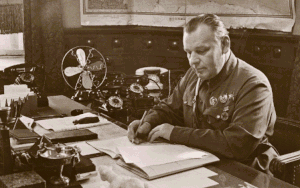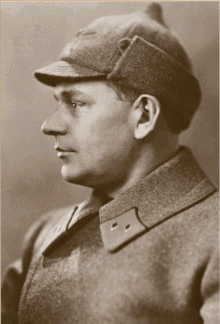Nikolai Vlasik
Nikolai Sidorovich Vlasik (Russian: Никола́й Си́дорович Вла́сик) (May 22, 1896 – June 18, 1967) was a ranking Soviet state security officer, Lieutenant-General, best known as head of Joseph Stalin's personal security from 1931 to 1952.

Military career

Nikoli Vlasik was born to a poor peasant family in the village of Bobynichi in the Slonimsky Uyezd of the Grodno Governorate of the Russian Empire (the present-day Hrodna Voblast, Belarus) on 22 May 1896.
In March 1915, he was drafted into the Russian Army. He was awarded with the Cross of St. George and by the time of the October Revolution had the rank of corporal.
In November 1917, he began serving in the Moscow militia. In September 1919, he was transferred to the Cheka. By January 1926, he had become the senior representative of the Operative branch of OGPU. Furthermore, Vlasik held supervising posts in the operations section, which included the protection of the heads of the party and government.
For many years, Vlasik was chief of Stalin's personal protective service in Kremlin, beginning in 1931 (this service was subordinated directly to Stalin and independent of the secret police, the NKVD). He also became, in essence, a member of the family. After the death of Stalin’s wife, Nadezhda Alliluyeva, he was also the tutor of Stalin’s children and practically carried out the functions of a major-domo.
In the memoirs of Stalin’s daughter, Svetlana Allilueva, she characterizes Vlasik as an "illiterate, silly, rough and extremely impudent despot". She said he was so corrupted by power that "he began to dictate to art workers and arts, tastes of comrade Stalin", and "...figures listened and followed his counsels. Any celebratory concert at the Bolshoi Theatre or George Hall did not take place without the sanction of Vlasik".
Arrest
On 15 December 1952, Vlasik was removed from his position and soon arrested on charges related to the Doctors' plot. Immediately after Stalin's death, all of the accused doctors were released and charges against them dropped. However, Vlasik was not released and the charges against him were changed to abuse of power and embezzlement. In 1955, he was stripped of his General rank and all decorations and exiled for ten years to Krasnoyarsk. In accordance with an earlier (27 March 1953) amnesty, his sentence was reduced to five years. In 1956, Vlasik was pardoned but his rank was not restored. In 2000, 33 years after his death, his sentence was annulled and he was completely exonerated.
In his memoirs Vlasik wrote, "I was severely hurt by Stalin. For 25 years of doing an irreproachable job, receiving nothing but encouragement and awards, I was excluded from the Party and flung into prison. For my boundless fidelity he gave me into the charge of my enemies. But never, for any minute of the condition I was in, to whatever mockeries I was exposed while in prison, had I in my soul any malice against Stalin".[1]
According to his wife, Vlasik was convinced that Lavrentiy Beria "helped" Stalin die.
Awards
- Cross of St. George, 4th class
- Three Orders of Lenin (26 April 1940, 21 February 1945, 16 September 1945)
- Order of the Red Banner, four times (28 August 1937, 20 September 1943, 3 November 1944)
- Order of the Red Star (14 May 1936)
- Order of Kutuzov, 1st class (24 February 1945)
- Jubilee Medal "XX Years of the Workers' and Peasants' Red Army" (22 February 1938)
- Honoured Worker of the Cheka-GPU, twice (20/12/1932, 16/12/1935)
Sources
- Власик Н. С. Моя биография //Логинов В. Тени Сталина. М., 2000. С. 136.